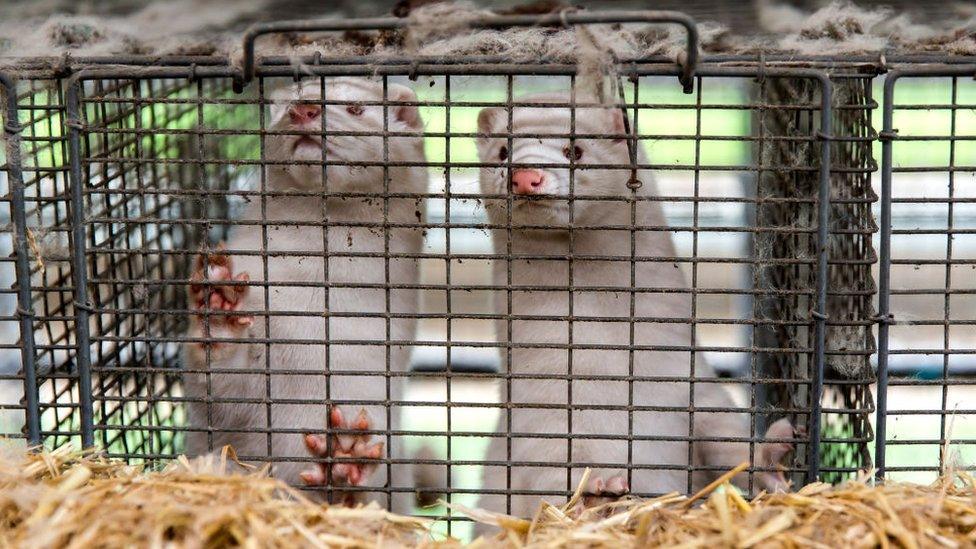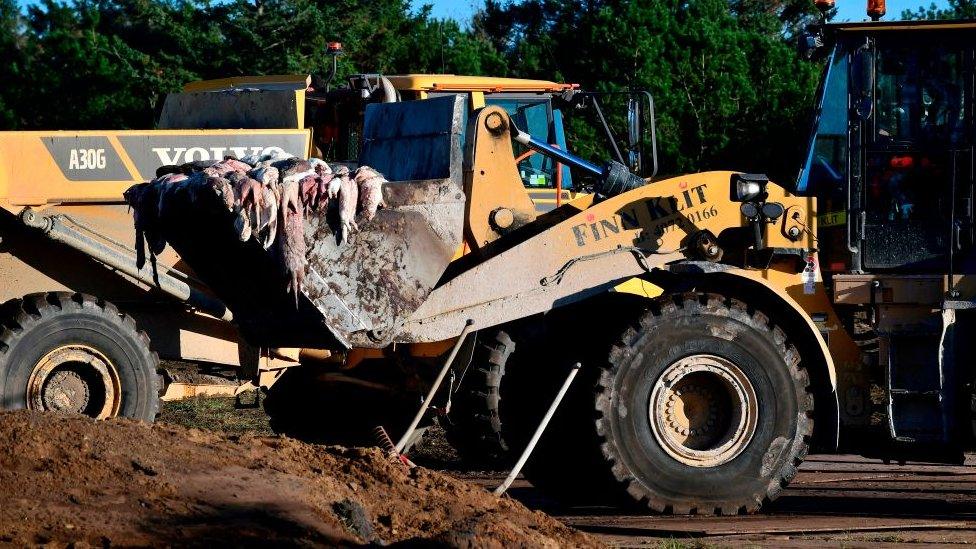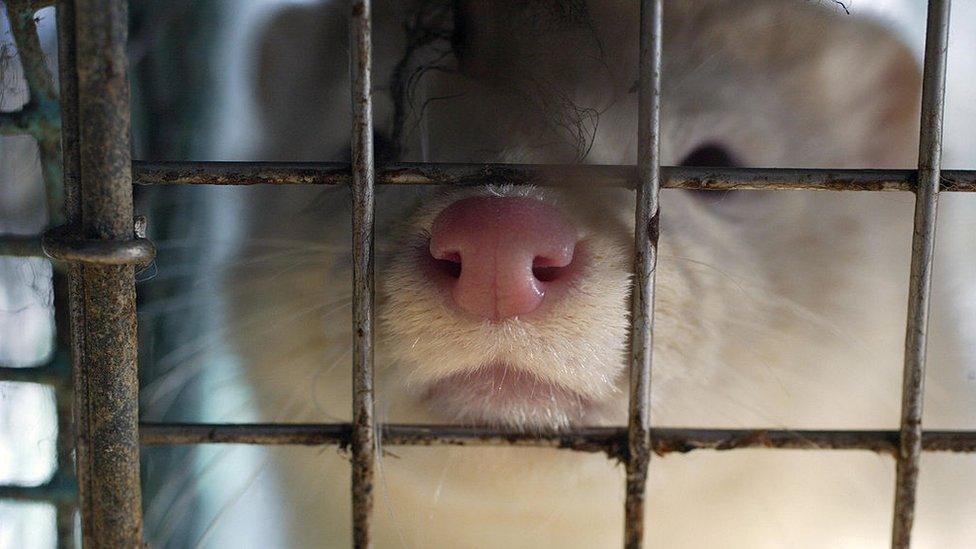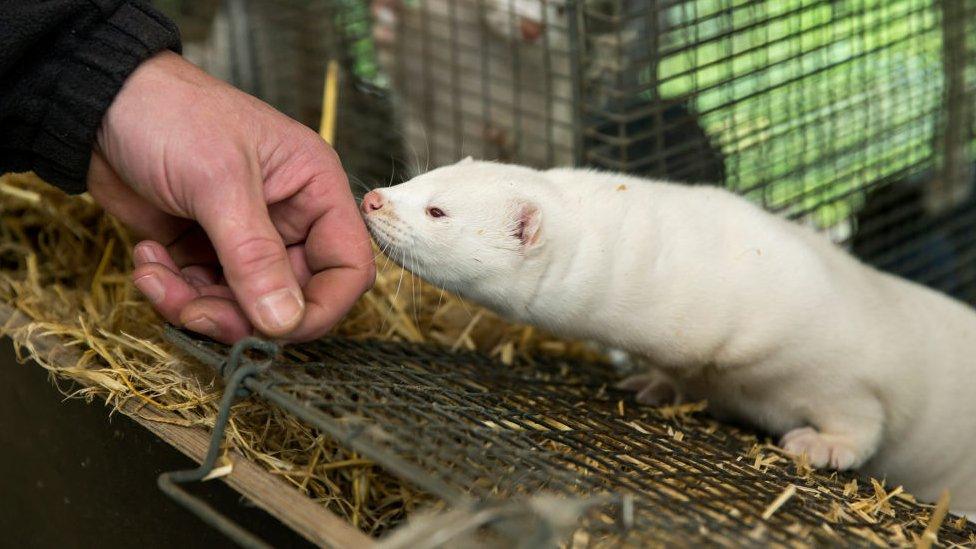'Mutant coronavirus' seen before on mink farms, say scientists
- Published

Mink are kept in crowded conditions, ideal for spreading a virus
A mutant form of coronavirus found in Denmark has arisen previously in mink, scientists have revealed.
The mutated virus, which appears to have spread from animals to humans in Denmark, has been detected retrospectively at a mink farm in the Netherlands, according to a leading Dutch expert.
The mink were culled and the mutated strain did not infect humans, he said.
Six countries have reported coronavirus outbreaks at mink farms.
They include the Netherlands, Denmark, Spain, Sweden, Italy and the US.
Mink are known to be susceptible to Sars-CoV-2, the virus that causes Covid-19, which can spread rapidly from animal to animal in conditions where thousands of animals are kept in close proximity.
The farmed weasel-like animals have become infected by farm workers during the pandemic, and have occasionally passed the virus on to humans, raising the risk of the virus acquiring mutations.
Danish scientists are worried that genetic changes in a mink-related form of the virus, infecting a dozen people, has the potential to make future vaccines less effective.
The genetic change is in the spike protein of the virus, which is important in the body's immune response, and a key target for vaccines.

The Danish government has ordered widespread culling of mink
The Danish genome sequences were recently released on a public database, allowing scientists in other countries to search for evidence of the mutation.
Prof Wim van der Poel, a veterinary expert at Wageningen University, said analysis of genetic data from the Netherlands revealed one previous case of the mutation at a mink farm in early May.
He told BBC News: "We have once seen a mutant virus with a comparable mutation in the spike protein encoding region, in mink in the Netherlands, but this mutant did not spread to humans and the mink of the involved farm were culled."
The Netherlands launched a widespread cull of mink after signs, in a small number of cases, that humans had picked up coronavirus from mink.

Mink, like their relatives, ferrets, are susceptible to respiratory viruses

The fur industry
Denmark is the world's biggest producer of mink fur and its main export markets are China and Hong Kong
Millions of animals are being culled due to concerns over coronavirus, but the country has not passed legislation aimed at closing its mink fur sector
The Netherlands, another top exporter of mink, has fast-tracked an existing plan to phase out fur farming, bringing the deadline forward from 2024 to 2021
France announced recently that it would ban farming mink for fur by 2025 and Poland may follow suit
Fur farming is banned in the UK.

The genetic data from Denmark was released on an international database a few days ago, with some scientists questioning why it had not been released sooner.
"I think that it is most disappointing that the data have only just reached the light of day," said Prof James Wood, head of the department of veterinary medicine at the University of Cambridge in the UK.
He said the genetic changes needed careful evaluation, as reports from Denmark suggested an effect on immunity. "This may be what triggered the enhanced quarantine measures for travellers from Denmark. But far more careful evaluation is urgently needed."
Mink farming required "enhanced biosecurity (or suspension) at this time", he added.
It is normal for viruses to change over time and accumulate mutations, but experts are particularly concerned when viruses pass between humans and animals.
Scientists believe another pandemic will happen during our lifetime
A number of animals have caught the virus from humans, but mink appear particularly susceptible.
Prof Dirk Pfeiffer, of the Royal Veterinary College in London, said while mutations in viruses happen all the time as they spread, the question is whether these change the characteristics of the virus.
"At this stage, it seems to be that there may be issues with vaccine effectiveness, but this is still unclear," he said.
Effective surveillance is needed to detect emergence of new pathogens early, and then have an effective way of responding, he added.
The European Centre for Disease Prevention and Control, an agency of the European Union, has said it will publish risk assessments on the spread of Sars-CoV-2 in mink farms this week.
It remains to be seen if the Danish mutation in the Sars-CoV-2 virus will be detected in mink farms in other countries. The outbreak of this mutated variant has become known as "cluster 5".
In Sweden, there have been outbreaks at mink farms in the south-east part of the country. Scientists reported that the genetic mutation found in Danish mink had not been detected so far.
Follow Helen on Twitter, external.
- Published9 November 2020
